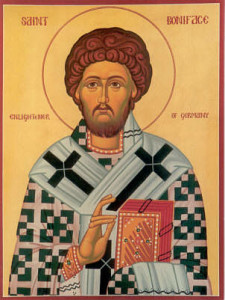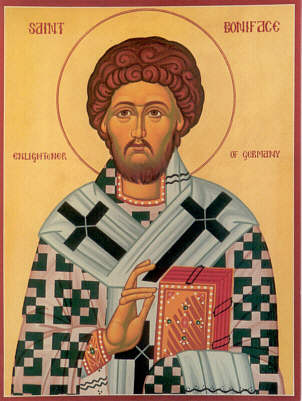Today we continue our regular series called “Learning from the Saints.” Our guide is expert Bert Ghezzi, a dear friend of mine and the author of numerous books including Voices of the Saints, Saints at Heart, and Discover Christ: Developing a Personal Relationship with Jesus.
His newest book is The Saints Devotional Bible, which illuminates the Scriptures with the saints’ own reflections. You can learn more about Bert and his work at BertGhezzi.com.
Today, Bert profiles St. Boniface, the eighth-century patron of brewers, Germany, and World Youth Day.
St. Boniface was the St. Paul of the “Dark Ages,” a blazing light in that badly misnamed epoch. In thirty-five years, this English missionary established the Catholic Church in Germany and revived it in the kingdom of the Franks, the medieval ancestor of France.
 Boniface, who was baptized “Winfred,” became a monk in his youth and was ordained a priest at age 30. He was renowned among the Anglo-Saxons for his Latin scholarship and Bible-based preaching and teaching. The saint made friends easily, using his exceptional personal magnetism to win others to Christ’s service. Had we been alive at the time, he may very well have captured our hearts and put us to work in his missions.
Boniface, who was baptized “Winfred,” became a monk in his youth and was ordained a priest at age 30. He was renowned among the Anglo-Saxons for his Latin scholarship and Bible-based preaching and teaching. The saint made friends easily, using his exceptional personal magnetism to win others to Christ’s service. Had we been alive at the time, he may very well have captured our hearts and put us to work in his missions.
In 715, Winfred recognized a divine call to spread the gospel in Germany, a mission which he pursued strategically. Three years later, Pope Gregory II commissioned him to evangelize in Germany and also changed his name to Boniface. The saint’s first mission in Hesse was so successful that in 722 the pope made him a bishop with jurisdiction over Germany. He also secured protection for Boniface from Charles Martel, the leader of the Franks.
Armed with the authority of church and state, Boniface continued his work in Hesse. He established his authority with a bold frontal attack on local paganism. Willibald, his first biographer, tells the story:
“At Geismar, surrounded by his companions, the saint decided to fell a gigantic oak, revered by the pagans as Jupiter’s Oak. A big crowd of pagans watched him cut the lower notch, cursing him in their hearts as an enemy of the gods. But when Boniface had scarcely chipped the front of the sacred tree, a divine blast from above crashed it to the ground with its crown of branches shivering as it fell. And as if by the gracious dispensation of the Most High, the oak also burst into four equal parts.
The bystanders could see four huge trunks, uniform in length, that had not been cut by Boniface or his associates. At this sight the pagans who had been cursing the saint, now, on the contrary, believed. They blessed the Lord and stopped their reviling. Then after consulting his companions, the holy bishop used the timber of the tree to construct an oratory there, which he dedicated to St. Peter, the apostle.”
That dramatic event gave Boniface momentum. He moved systematically to establish the Church in Germany and to renew it in France. He founded monasteries throughout Germany, which became centers of education and evangelization. He staffed them with his Anglo-Saxon friends, who eagerly responded in unprecedented numbers to his invitation to serve. After 731, he founded dioceses throughout Germany, appointing his Anglo-Saxon companions as bishops. Later, supported by the Frankish kings, he called councils to reform the decadent church in their kingdom. In 747 the pope appointed Boniface the archbishop of all Germany and located his see at Mainz.
Boniface “retired” in 753, but did not stop working. He went to Friesland to recover lapsed Christians and win new converts. On Pentecost eve, 754, as he was preparing for an open-air confirmation ceremony, a band of marauders martyred him and his companions.
With heroic fortitude, doggedness and vision, St. Boniface changed his world. His strategic establishment of the Catholic Church throughout Germany and France created the first European unity, the basis for Western civilization. My sights are somewhat lower. Maybe with a little fortitude, doggedness and vision, I can influence my family, friends and neighbors for Christ.
(Image Credit: All Merciful Savior)
Read more from Bert at his website www.BertGhezzi.com, or check out his many books on Amazon.
 |
 |
 |
 |


